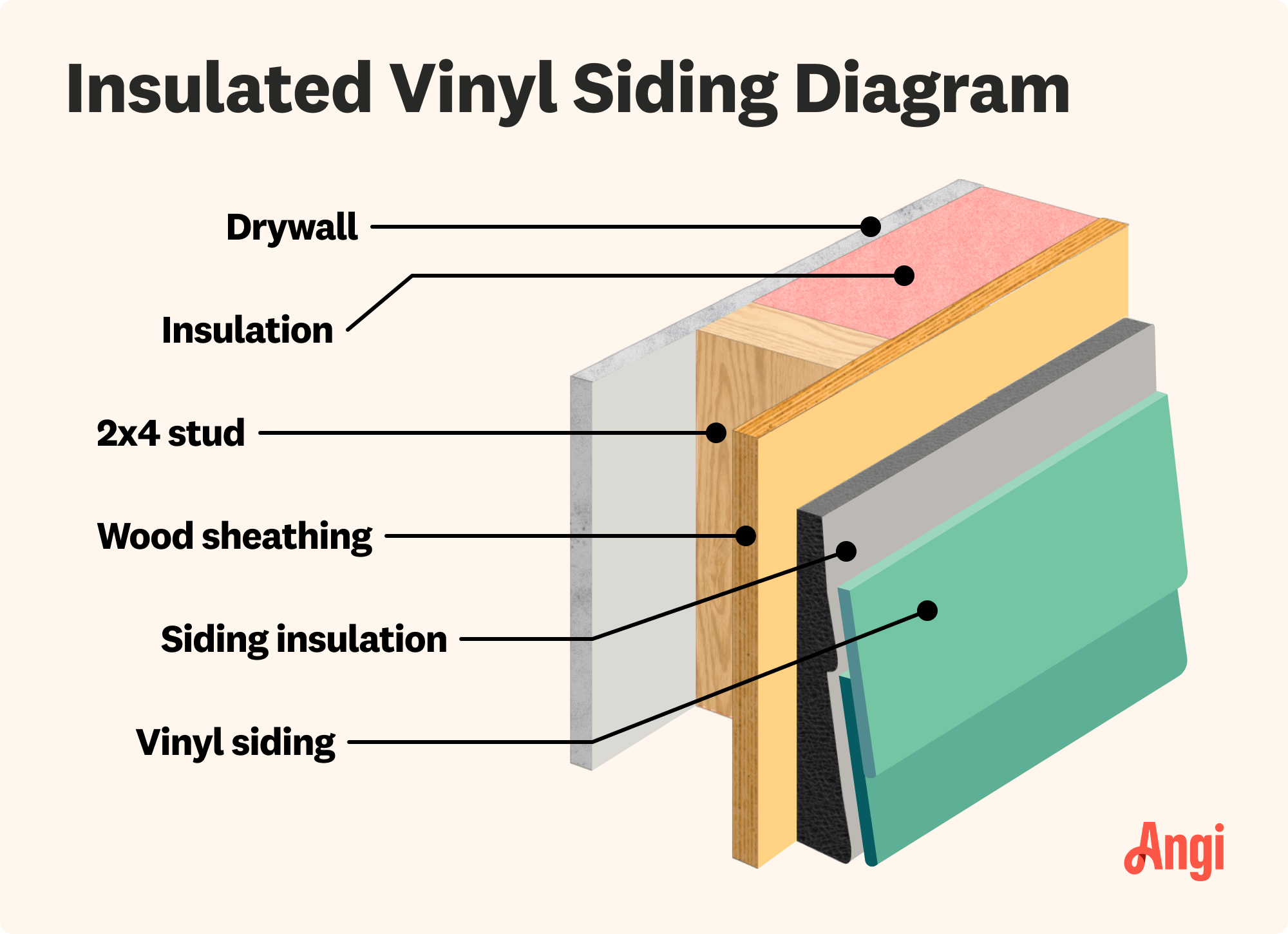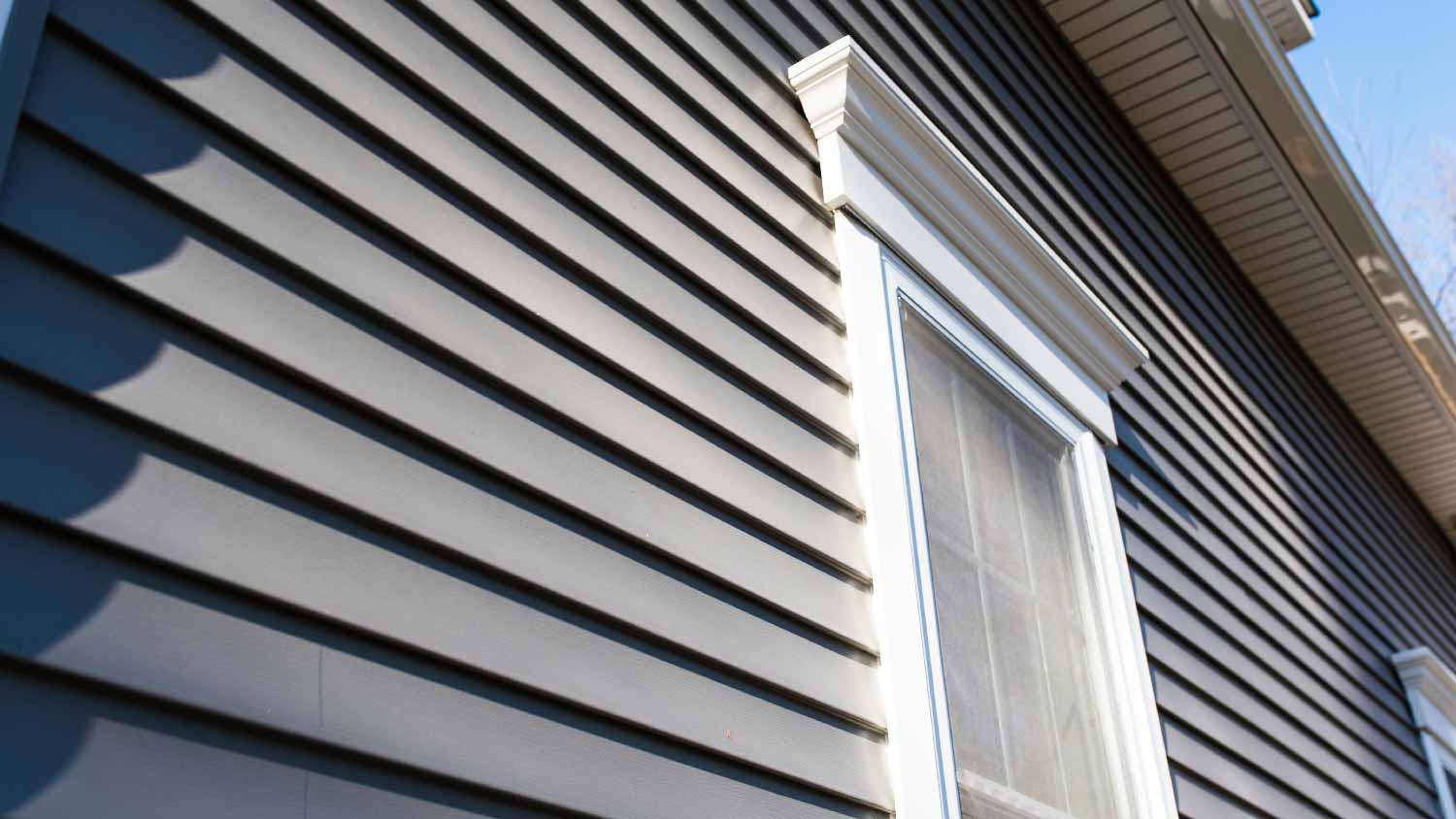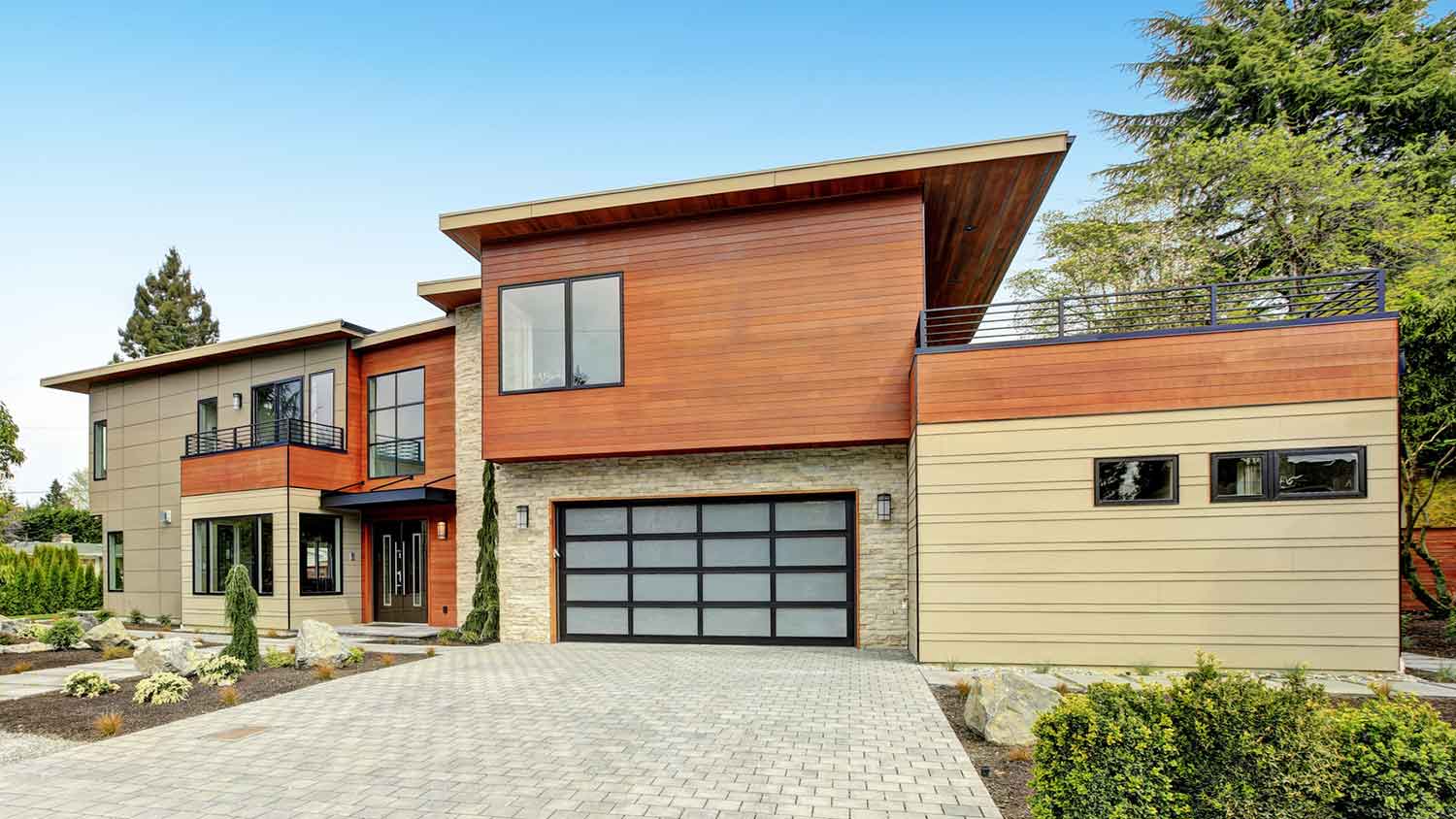
Love the rustic look of log cabins but want a more durable siding? Use this vinyl log siding cost guide to see if this is a good alternative for your home.
Insulated vinyl siding installation costs an average of $14,000, but can range between $6,000 and $20,000. Expect to pay more for a larger home or premium materials, or if you live in a high-cost-of-living area.


Insulated vinyl siding costs an average of $4 to $12 per square foot.
You may see a return on investment (ROI) of up to 80% on insulated vinyl siding.
Costs depend on home size, location, labor costs, and more.
Insulated vinyl siding costs about $8 per square foot, but prices can range between $4 and $12 per square foot. On the low end, homeowners might pay $4,000 for a home with 1,000 square feet of exterior walls. On the high end, costs can reach $30,000 for a house with 2,500 feet of exterior walls. A typical home that has 1,750 square feet of exterior walls will cost an average of $14,000.
The cost of insulated vinyl siding is more than traditional vinyl siding, but it’s still fairly affordable compared to other types of siding. Costs will depend on the size of your home and where you live. You may also incur additional insulated vinyl siding costs, like removing siding and purchasing permits.
Insulated vinyl siding is a premium type of vinyl that adds an extra layer of insulation to your home with expanded polystyrene insulation. It’s more efficient and durable than typical vinyl, helps to reduce outside noise, and better protects against pests.

Unsurprisingly, the larger your home is, the more you’ll spend on new siding—no matter what type of siding you’re installing. You’ll have to purchase more materials, and the time to install will be longer or require more professionals, resulting in higher labor costs.
The square footage of your home is not the best way to estimate siding costs, however. Instead, you’ll want to get accurate measurements of each of the exterior walls you plan to cover with insulated vinyl siding. The table below shows how the square footage of exterior walls can impact insulated vinyl siding costs.
| Exterior Wall Square Footage | Insulated Vinyl Siding Cost Range |
|---|---|
| 1,000 | $4,000–$12,000 |
| 1,250 | $5,000–$15,000 |
| 1,500 | $6,000–$18,000 |
| 1,750 | $7,000–$21,000 |
| 2,000 | $8,000–$24,000 |
| 2,250 | $9,000–$27,000 |
| 2,500 | $10,000–$30,000 |
Don’t forget about waste: Expect to have about 10% to 20% of material waste when installing vinyl siding. This means you’ll need to purchase more siding you need, which allows for uniquely shaped cuts and mistakes. It also means you can keep scraps on hand for vinyl siding repair.
The amount of siding materials required accounts for roughly half of the insulated vinyl costs. That means the siding (usually sold in 100-square-foot squares) costs between $2 and $6 per square foot. If you’re attempting to DIY the installation to save on labor, you may have other tool and supply costs, like scaffolding and ladders, nails, and a chalk line.
Areas with a higher cost of living may have higher material and labor costs. To get a sense of what siding contractors near you charge for their labor, get quotes from at least three different siding companies.
| Location | Average Cost |
|---|---|
| New York, NY | $16,400 |
| Los Angeles, CA | $11,200 |
| Chicago, IL | $13,500 |
| Nashville, TN | $11,400 |
| Houston, TX | $8,100 |
| Charlotte, NC | $9,500 |

Several factors can impact your overall project costs when installing insulated vinyl siding, including the size of your home and how easy it is to access.
Labor accounts for roughly half the cost of vinyl siding installation. Some homeowners try to save money on installation by doing the work themselves, but this could cost more in the long run. Not only will you have to forfeit several days for the work and purchase tools and supplies, but you also have to worry about not doing the job right—and not having it backed by a contractor’s limited warranty.
Incorrectly installed vinyl siding can result in heat loss and pest issues, and may reduce the lifespan of the siding or make it more prone to damage during storms. If you think you’re up for the task, though, here’s how to install vinyl siding on your own.
If your home has multiple stories, contractors will need to use ladders or scaffolding to complete the job. This can add risk and time to the project, which may increase installation costs. Similarly, if your home is surrounded by large shrubs, bushes, trees, and other vegetation that make installation more challenging, you can expect labor costs to go up.
If you live in a colder climate, siding companies may not do much work in the winter, and they’ll have high demand going into and coming out of the cold season. For that reason, summer is often the best time of year to install siding. Contractors will have more availability and may offer lower rates.
Most siding projects require building permits. Siding contractors usually get these on your behalf and work the fee into their overall cost, but you should always ask the contractor if you need a permit and how to get one. If you’re tackling this project on your own, call up your municipality to understand what permits are required.
If you’re not installing siding on a newly built home, you’ll also need to factor in the removal and disposal of existing siding. Siding contractors usually work this into their rate, but if you’re removing old siding on your own, don’t forget to budget for junk removal costs, usually $150 to $350.
In some cases, it may be more cost-effective to repair your insulated vinyl siding rather than replace it. Here are a few ways to decide whether repair or replacement is the right choice.
| Factor | Repair | Replace |
|---|---|---|
| Cost of repair vs. new siding | Repair is less than 50% of replacement cost | Repair exceeds 50% of replacement cost |
| Siding age | Less than 20 years | More than 20 years |
| Level of damage | Localized fading or cracking | Widespread fading or cracking |
| Water intrusion | Limited water intrusion | Widespread water intrusion |
New siding can increase your home’s value, offering an ROI of up to 80%. Weigh insulated vinyl siding’s pros and cons before deciding to install—the higher up-front costs will help reduce energy costs and protect against pest damage. New siding is also an appealing feature for prospective buyers when it’s time to sell, and insulated vinyl siding will set your home apart from comparable properties.
Installing vinyl siding on your own is doable, but unless you have experience with siding projects in the past, we highly recommend leaving this one to a professional. They will ensure correct installation for better efficiency, noise reduction, and pest and weather resistance.
Even if you’ve installed vinyl siding before, keep in mind that insulated vinyl siding is heavier than traditional vinyl, which can make it more challenging for DIYers with some prior experience. Hire a siding contractor with experience installing insulated vinyl siding for peace of mind that the job’s done right.
While you can install siding yourself, we recommend contacting a pro. Improper installation can decrease the lifespan of the siding and cost more money in the long run.
While you may be able to save up to 50% of the cost of insulated vinyl siding by installing it yourself, improper installation may end up costing you more in the long run. If you don’t have experience installing siding, you can still save on your insulated vinyl siding installation.
Choose a midrange siding to get a longer lifespan than budget options at a lower initial cost than premium brands.
Get quotes from at least three siding contractors to find one that best fits your budget.
Do some of the prep work yourself to save on labor costs.
Look for rebates or incentives from your state or municipality for installing energy-efficient insulated vinyl siding.
Home is the most important place on earth, which is why Angi has helped more than 150 million homeowners transform their houses into homes they adore. To help homeowners with their next project, Angi provides readers with the most accurate cost data and upholds strict editorial standards. We extensively research project costs to develop the pricing data you see, so you can make the best decisions for you and your home. We rely on reputable sources, including the U.S. Bureau of Labor Statistics, academic journals, market studies, and interviews with industry experts—all to ensure our prices reflect real-world projects.
Want to help us improve our cost data? Send us a recent project quote to [email protected]. Quotes and personal information will not be shared publicly.
From average costs to expert advice, get all the answers you need to get your job done.

Love the rustic look of log cabins but want a more durable siding? Use this vinyl log siding cost guide to see if this is a good alternative for your home.

Mobile home skirting replacement costs come down to the material you choose and the size of your home. Use this guide to budget for your skirting project.

Not sure how much vinyl siding costs? To prepare your budget for an upcoming siding project, read on to learn about average supply and labor costs.

Knowing whether to install windows or siding first can save you time and money on your renovations. Here’s everything you need to know before you get started.

Wondering how to plan and shop for vinyl siding? This guide covers vinyl siding dimensions, how to measure your home exterior, and more.

Installing the right cladding protects your home and boosts its curb appeal. Learn about different types of cladding so you can choose the best one for your home.